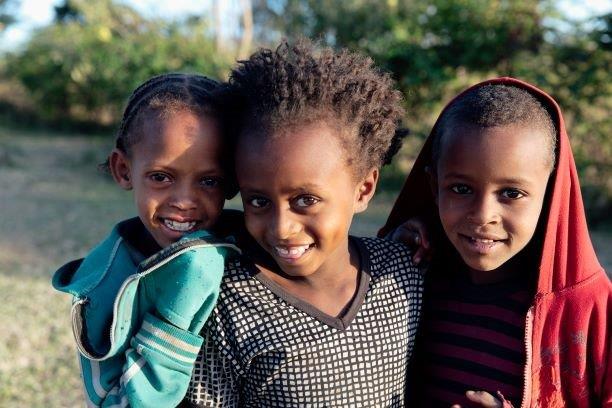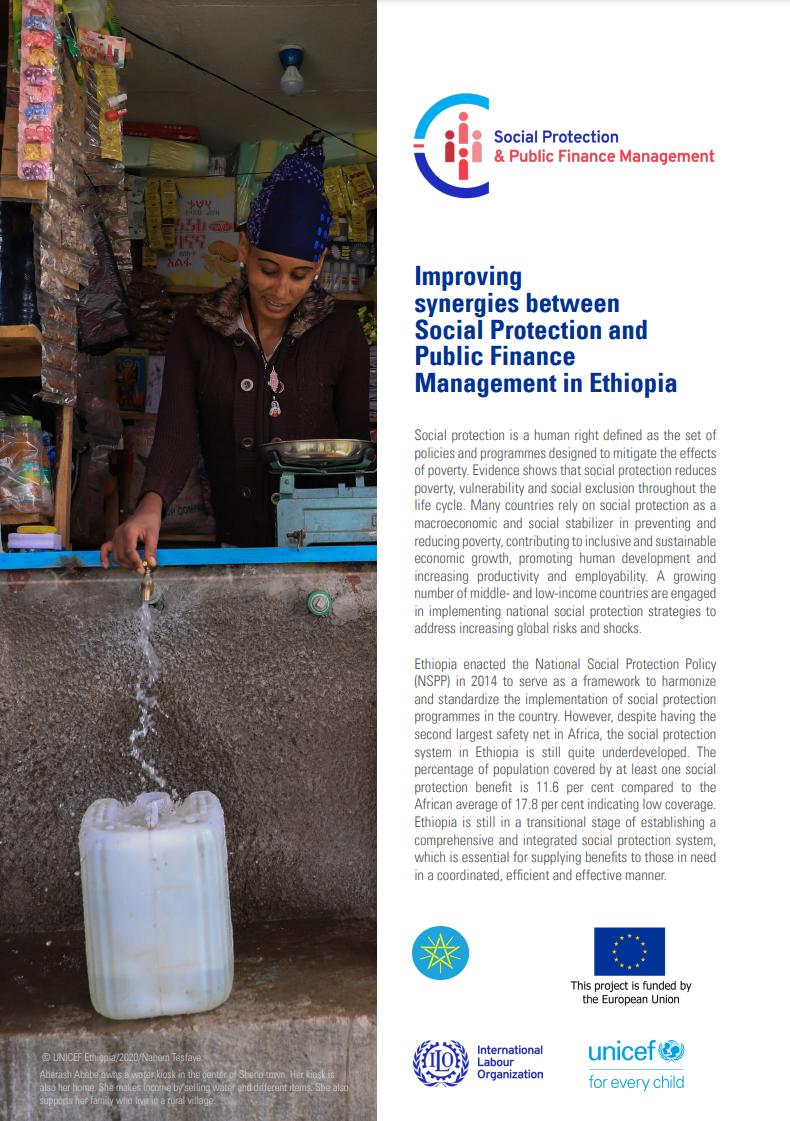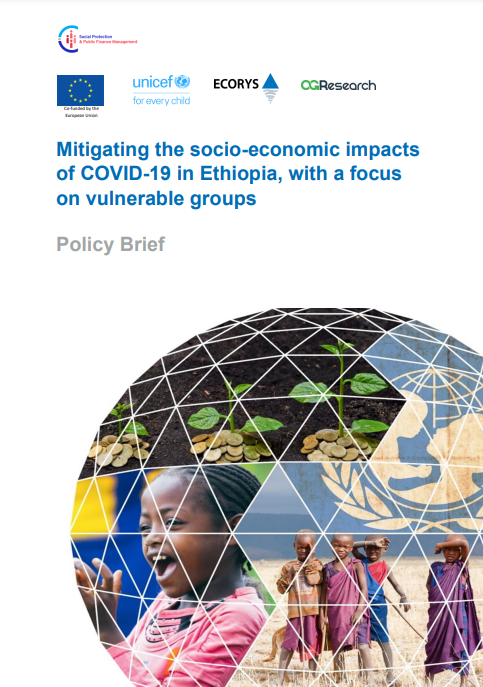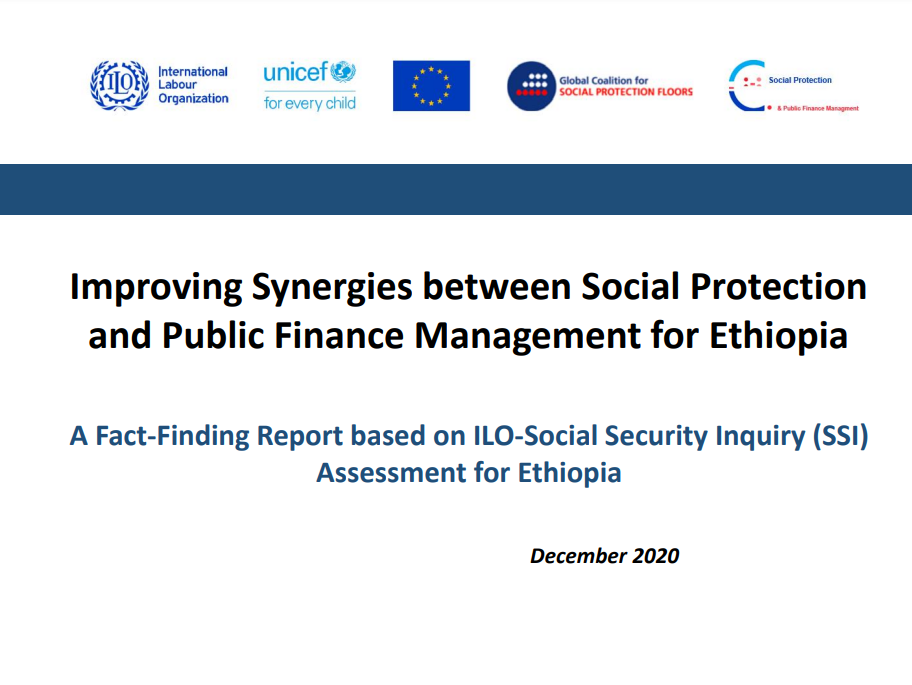Ethiopia
379,000 internally displaced persons benefited from shock responsive cash transfers
SP&PFM supported the national authorities in 6 regions to rapidly respond to the extremely unstable humanitarian situation across the country in 2022 to deliver shock responsive cash transfers to IDPs affected by conflict, droughts, and floods.
27 journalists trained to promote disability inclusion in social protection
SP&PFM organised the capacity building activity to foster the development of media content and advocacy material that contribute towards strengthening the communication and visibility of disability mainstreaming within social protection systems.

40 representatives from trade unions, workers’ and employers’ organisations engaged to promote coverage extension to informal workers
Activity promoted by SP&PFM was carried out within efforts of promoting capacity building on improving Social Protection to formal private business sector and extension to informal economy workers.
In Ethiopia, the SP&PFM project aimed to support and strengthen the country’s social protection system through sustainable financing. Activities included informing policymakers on the vulnerability of households affected by COVID-19, understanding the public finance landscape and providing financing options for social protection in the short and medium-term.
The project was committed to enhancing the coordination and monitoring capacity of the Ministry of Women and Social Affairs (MoWSA) for the national social protection system. The project also supported and facilitated stakeholders’ dialogue and enhanced appropriate governance structures and institutional capacity towards a more integrated and efficient social protection system in the country.
Activities were focused on three key areas:
- Producing a financing strategy for social protection in Ethiopia with short-term and medium-term options;
- Assessing the means to extend social security to informal economy workers and supporting wage legislation related to social protection;
- Building the capacity of MoWSA to effectively monitor the social protection system.
Key results achieved
The project achieved a number of results related to the three planned outputs to strengthen the synergy between public finance management and social protection in Ethiopia.
1. Developing financing strategy for social protection:
- A vulnerability assessment on COVID-19 in Ethiopia and a socio-economic impact analysis of COVID-19 in Ethiopia was conducted in 2020. The studies identified the most vulnerable groups affected by the pandemic and looked at the implications of the socio-economic shocks stemming from the crisis and provided recommendations for addressing its consequences in terms of policy options for decision-makers as well as practical actions by government and development partners.
- The social protection policy eligibility assessment of Ethiopia was conducted in 2020. The assessment analyzed the policy framework, coherence with development policies, relevance and credibility from the perspective of social protection implementation and public finance management (PFM).
- The project produced final reports on the actuarial valuation of the Civil Service Pension Fund (CSPF) and Private Organizations’ Employees’ Pension Fund (POEPF) in 2021. The reports are intended to inform reform options on the financial sustainability of the schemes and provide improvement in the governance of the pension schemes. The actuarial valuation reports of the Public Servants’ Social Security Agency (PSSSA) and the Private Organizations’ Employees Social Security Agency (POESSA) of Ethiopia were disseminated in a workshop in May 2022. Stemming from the findings and recommendations of this actuarial, the Government of Ethiopia, through the Ministry of Finance, requested further technical support to articulate a pension investment strategy, data governance and coverage extension works.
-
In 2022, the project produced an independent technical feasibility assessment of the Social Protection Fund (SPF) which the Ministry of Women and Social Affairs (MoWSA) had proposed to be established as a financing strategy option. The feasibility assessment considered possible changes to the SPF design which might enhance its effectiveness and improve its prospects for long term success. It also assessed the potential added value of the mechanism and provided options related to setting up and managing such a fund. The feasibility assessment was validated and submitted to the government. The project also engaged with the government on an investment case for social protection and financing options under this output. The project discussed the inception report, social protection spending trends and scenarios to inform the investment case with the project’s core group and engaged various stakeholders. The project worked closely with MoWSA on this assignment.
-
As the financing of social protection is not only about increasing fund allocation but needs to equally address better use of existing funds through improved efficiency and effectiveness of public finance management, the project team provided technical assistance towards improving budget transparency and accountability and helped inform the public finance management reform strategy led by the Ministry of Finance.
2. Extending social security to informal economy workers and supporting wage legislation related to social protection:
-
The Project conducted a technical study on the extension of social protection to informal economy workers to provide policy recommendations on extending coverage and pursuing actions on formalization. A validation workshop on the report of the technical study was held in April 2022, from which important inputs such as the need to have a systemic approach to social protection which illuminates the importance of coverage extension to all workers was discussed. Furthermore, it was agreed that stronger advocacy on coverage extension to the informal economy should be undertaken and the planned revision of the National Social Protection Policy (NSPP) and employment policy in 2023 should incorporate coverage extension to the informal economy.
-
The project supported the development of a Position Paper by the Confederation of Ethiopian Trade Unions (CETU) on “Improving Social Protection Compliance” of formal private sector enterprises that are members of CETU.
3. Building the capacity of MoLSA to effectively monitor the social protection system:
- The project provided a continuos support to the Federal Social Protection Platform (FSPP) that was established and launched in October 2020 to maintain momentum and build greater coordination for the social protection sector. Six platform meetings were held since the initiation of the project. The meetings served as discussion forum for relevant social protection issues, experiences sharing, and providing update for new social protection related developments. The platform served as a key coordination mechanism for social protection bringing together key stakeholders from government, development partners and Civil Service Organizations (CSOs) working on social protection.
- The social protection mapping report and the social protection data collected through the Social Security Inquiry (SSI) in 2020 were formally submitted to MoWSA for application as a social protection monitoring tool for reporting on SDG 1.3. To enable MoWSA to monitor the social protection system in Ethiopia and to report on SDG 1.3. on social protection coverage, expenditure and adequacy, the project supported the training of two data base experts of the Ministry on using the Social Security Inquiry (SSI) tool. The training comprised a hybrid approach with application through online training led by ITC and followed by a physical training in South Africa. With this knowledge acquisition, data on Ethiopia’s social protection system coverage can be regularly monitored and updated to inform evidence-based programming and policy formulation, and track the country’s progress towards universal social protection.
- The project provided technical assistance to MoWSA to coordinate and manage a mobile based monitoring application to track COVID-19 top-up cash transfers for the Urban Productive Safety Net Programme (UPSNP) clients in 2020. This has contributed to improving the capacity of MoWSA to standardize the management and implementation of the Permanent Direct Support (PDS) component of both the Rural Productive Safety Net Programme (RPSNP) and the Urban Productive Safety Net Programme (UPSNP).
- With other complementary donor financing, the Project supported MoWSA and regional Bureaus of Women, Children and Social Affairs (BoWCSAs) to implement a shock responsive social protection mechanism through cash transfers to conflict and drought affected Internally Displaced Persons (IDPs). With the technical support of the Project team, the response has been successfully implemented in six regions, with robust monitoring through a mobile-based post distribution monitoring application (KoboCollect). Digitisation of beneficiary registration was also piloted and expanded in Amhara and Somali regions. This initiative showcases the importance of the institutional capacity-building work for MoWSA and respective Bureaus who were able to deliver cash transfers and social services effectively and efficiently. The financing came primarily from donors through their humanitarian funding channels, and in many cases, this was the first time the funding was channelled through government systems. In terms of sustainability, the Project carried out an assessment of how supporting IDPs can be integrated into the existing social protection system. Till its conclusion, the Project influenced the government and World Bank to incorporate IDPs into the existing Urban Productive Safety Net Programme.
- The Project supported the celebration of the International Day of Persons with Disabilities (IDPD) observed on 02-03, December 2022 in Dire Dawa City with various events organised by MoWSA and FEAPD. The IDPD was attended by Ministers, UN Agencies, Ambassadors and representatives of the Diplomatic Missions (e.g. EU, U.S, Ireland, India), officials of Dire Dawa city Administration, representatives of Organisations of Persons with Disabilities (OPDs), Youth and Women Groups, persons with disabilities and residents of the city. The events included panel discussion, music, poems, photo exhibitions, product exhibitions by disabled persons, sports, and a parade in the city with a march band. The SP&PFM Project did a presentation on disability inclusion in the IDPD panel discussion. The IDPD celebration was an important national undertaking to raise public awareness on disability and promote the agenda of inclusion of persons with disabilities in the Ethiopian society.
- The Project supported the organization of the annual Labour and Social Protection forum of MoWSA which was critical in guiding and setting the tone on the Ministry’s mandate in responding to the government’s overall agenda on social protection and labour affairs. ILO’s tripartite partners plus regional bureaus participated in the annual conference to appraise the sector’s achievements of 2021 and agree on key deliverables for 2022.
- The project supported MoWSA to develop a knowledge management platform. This tool will strengthen the Ministry’s social protection coordination mandate by consolidating data on social protection coverage, performance of social protection programmes, and information on financing of social protection into one platform. With the support of an MIS specialist provided through this Project, an Integrated Social Affairs MIS was developed to support better digital management of data and reporting. The integrated MIS will be used to gradually digitise data management and reporting that have been mostly paper-based to date.
- To generate longer-term and sustainable capacity building support, the project continued to provide financial and technical support for MoWSA through a comprehensive institutional capacity support to MoWSA. This engagement was a hybrid model of support, combining technical assistance, advisory services and hands-on capacity support as well as training of existing /new staff. During 2022, the development of an inception report, capacity assessment report and capacity development strategy and road map were completed. Strong progress is also made in reviewing and supporting MoWSA with monitoring and evaluation processes, and training materials on coordination, public relations/communications, targeting/grievances and complaints processes, as well as report writing. These were reviewed and rolled out in 2023.
- The Project also provided technical support to MoWSA through the deployment of a Policy Advisor, Monitoring and Evaluation Specialist and MIS specialist in core business areas. The Project has also contracted an expert to provide technical advice to the State Minister (Social Affairs) and the Social Protection Directorate on social protection policy/programme issues including monitoring.
- The Project provided support to the Federation of Ethiopian Associations of Persons with Disabilities (FEAPD) in July 2021 on promotion of disability inclusion in the Ethiopian Social Protection System through awareness building amongst government and media organisations on advocating for the review of the national social protection policy and strategy to be more disability inclusive. A Working Group has been established to continue advocating for disability inclusion under the auspices of FEAPD. Additional training was delivered to nine media institutions on promoting disability inclusion in social protection in September 2022. Following the training, 3 media outlets were selected and commenced working on media content development to conduct and advocate through media on disability inclusion in social protection programmes including the Productive Safety Net Programme (PSNP). Linked to this, the project collaborated with MoWSA through the disability directorate to provide in-house capacity building amongst the regional bureau officials on disability mainstreaming within the urban PSNP.
- The project has strengthened disability inclusion given the multiple and overlapping shocks during 2022, and the particular vulnerabilities suffered by people and children with disabilities among displaced populations. The project supported a Shock Response Cash Transfer programme to provide a financial top-up to households with a member with disability and instituted training options for social workers on disability inclusive social protection. Disability inclusive social protection continues to grow with more purposeful targeting and additional support to children with disability in displace settings. Thus, the project has enhanced MoWSA and BoWSA capacity on shock response.
- Both RPSNP-5 and UPSNP continued to provide unconditional cash transfers to Permanent Direct Support (PDS) clients (many of whom are people with disabilities) and provide them linkages to services with the support of social workers. In 2023, the Project continued to advocate for further mainstreaming of disability inclusion within the PSNP-5.
- The project promoted the mainstreaming of multisectoral cooperation on disability inclusion. Such activities included provision of spatial accessibility, capacity building, cooperation with organization of people with disabilities (OPDSs), or provision of disability financial support for PWDs to cover their additional costs of living. Thanks to cooperation with FEAPD, people with disabilities received vaccination against COVID-19, the accessibility of water and sanitation (WASH) facilities was improved, and moreover shock response included disability financial support for children with disabilities. In cooperation with MoWSA, assistive devices (such as crutches, wheelchairs, canes, and brail material) were delivered to enhance inclusion of children into society.
Resources
- Social Security Inquiry (SSI) Final Narrative Report for Ethiopia
- Socio-economic Impact Analysis of COVID-19 in Ethiopia
- COVID-19 Socio-economic Vulnerability Assessment of Ethiopia
- Policy Brief on Mitigating the socio-economic impacts of COVID-19 in Ethiopia
- Annex 1 – Vulnerability Impact Fiches (Mitigating the socio-economic impacts of COVID-19 in Ethiopia)
- Presentation on “Social Protection Programs Coverage and Context in Ethiopia”
- Social Protection-PFM Project Introductory Brochure for Ethiopia
Events
- Peer-to-Peer Country Exchange Visit on Promotion of Universal Social Protection Systems based on Sustainable Financing (May 8-13, 2023)
- Training Workshop on Social Security and Unemployment Insurance for Representatives of Employers, Managers, and Workers in the Private Sector (April 5, 2023)
- Consultative Workshop on Disability Inclusion within the Fifth Phase of the Productive Safety Net Programme (PSNP V) in Ethiopia (February 24-25, 2023)
- Consultative Workshop on Establishment of Unemployment Insurance in Ethiopia (December 9, 2022)
- Celebration of the International Day of Persons with Disabilities (IDPD) (December 2-3, 2022)
- The sixth Ethiopian Federal Social Protection Platform Meeting (September 26, 2022)
- Training workshop for Strengthening the Role of Media in Promoting Inclusive Social Protection (September 22-23, 2022)
- Tripartite Plus Consultation on improving social protection to formal private sector and extension to workers in the informal economy (September 20-21, 2022)
- Actuarial valuation reports of the Public Servants’ Social Security Agency (PSSSA) and the Private Organizations’ Employees Social Security Agency (POESSA) of Ethiopia : Dissemination Workshop (May 20, 2022); article on Workshop presentations and conclusions
- The fifth Ethiopian Federal Social Protection Platform Meeting (May 4, 2022)
- The Fourth Reference Group Meeting of the SP&PFM Project in Ethiopia (April 7, 2022)
- Validation workshop on the study of “Extending Social Protection to Informal Economy Workers in Ethiopia” (April 5, 2022); article on workshop conclusions
- The Fourth Ethiopian Federal Social Protection Platform Meeting (August 16, 2021)
- Consultative Workshop on Disability Inclusion within the PSNP V in Ethiopia (November 24-26, 2021)
- Workshop on Raising Awareness on Disability Inclusive Social Protection in Ethiopia (July 13-14, 2021)
- Tripartite Consultation Workshop on Social Protection Extension to Formal and Informal Workers (May 18-19, 2021)
- The Third Ethiopian Federal Social Protection Platform Meeting (April 16, 2021)
- Workshop on Disability Inclusive Social Protection for Organizations of Persons with Disabilities in Ethiopia (April 16-17, 2021)
- The Third Reference Group Meeting of the SP&PFM Project in Ethiopia (April 8, 2021)
- Consultative Workshop on Social Protection in Ethiopia (March 11-13, 2021)
Project partners
The initiative is implemented jointly by the ILO and UNICEF, in close collaboration with the EU Delegation in Ethiopia. The project has established a Reference Group to advise on strategic directions and the overall scope of the project as well as to review its implementation. The group includes the following members: United Nations Children’s Fund (UNICEF), International Labour Organization (ILO), Delegation of the European Union to Ethiopia (EU), Ministry of Labour and Social Affairs (MoLSA), Ministry of Finance (MoF), Planning and Development Commission (PDC), Ministry of Agriculture (MoA), Urban Food Security and Job Creation Agency (UFSJCA), Public Servants’ Social Security Agency (PSSSA), Private Organisations’ Employees Social Security Agency (POESSA), Confederation of Ethiopian Trade Unions (CETU), Ethiopian Employers’ Confederation (EEC), World Bank (WB), Addis Ababa University (AAU), HelpAge International Ethiopia on behalf of the Global Coalition for Social Protection Floors (GCSPF), Federation of Ethiopian Associations of Persons with Disabilities (FEAPD) and one representative from the Donor Coordination Team (DCT), Rural Productive Safety Net Programme.
Contacts
Mr. Fantahun Melles, ILO National Project Coordinator, fantahun@ilo.org
Ms. Mwenya Kapasa, ILO Technical Officer, Social Protection , kapasa@ilo.org
Mr. Samson Muradzikwa, UNICEF Chief Social Policy, smuradzikwa@unicef.org
Ms. Zeleka Paulos, UNICEF Social Policy Specialist, zpaulos@unicef.org
Ms. Fanaye Tadesse, UNICEF Social Policy Specialist, ftechane@unicef.org
Children, Ethiopia, 2018.
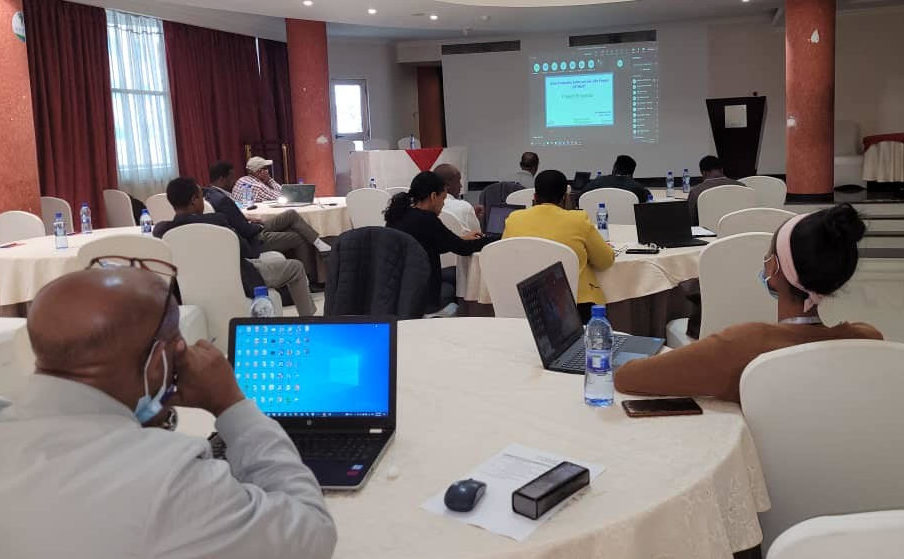
Fifth Ethiopian Federal Social Protection Platform meeting (September 2022)
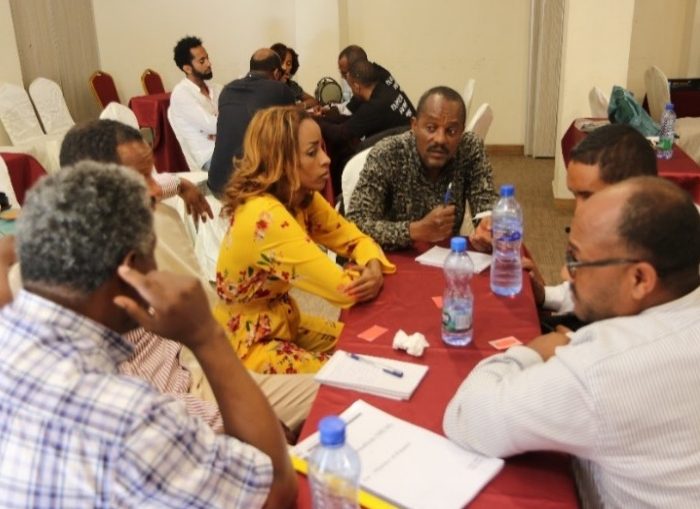
Training workshop for Strengthening the Role of Media in Promoting Inclusive Social Protection (22-23 September 2022).
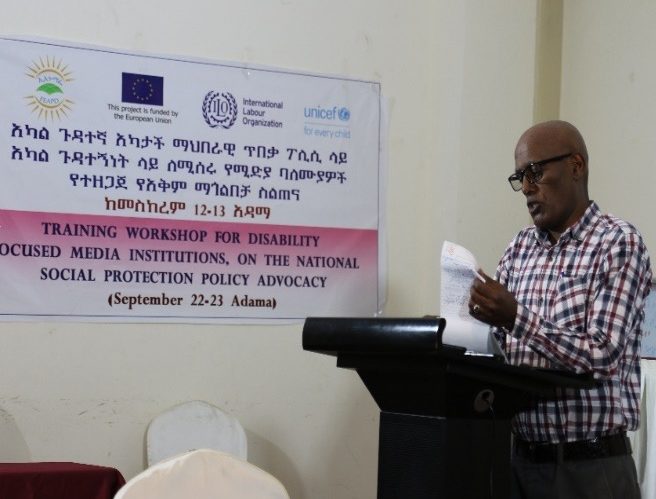
Training workshop for Strengthening the Role of Media in Promoting Inclusive Social Protection (22-23 September 2022).
Socio-economic Impact Analysis of COVID-19 in Ethiopia (2020)
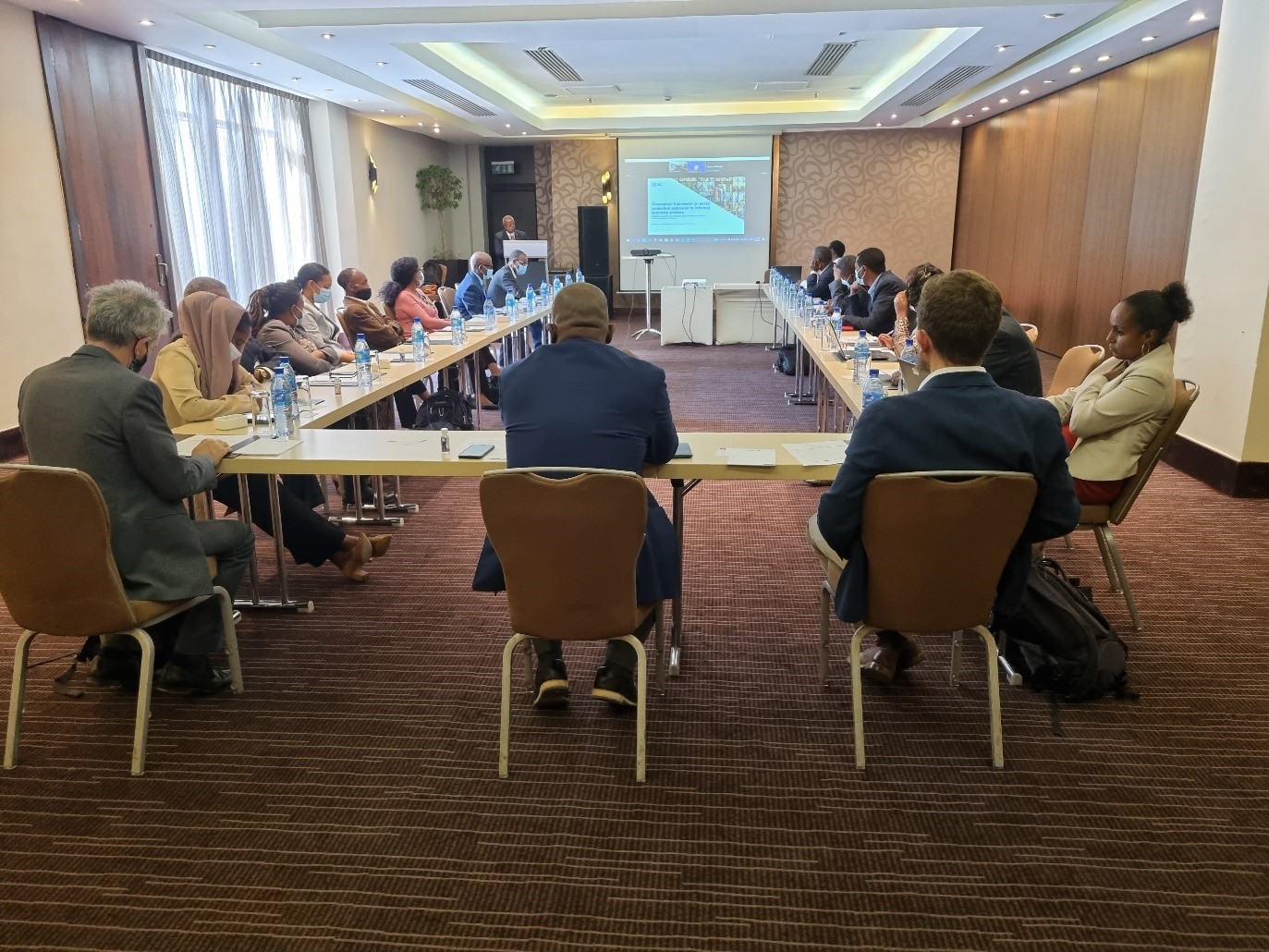
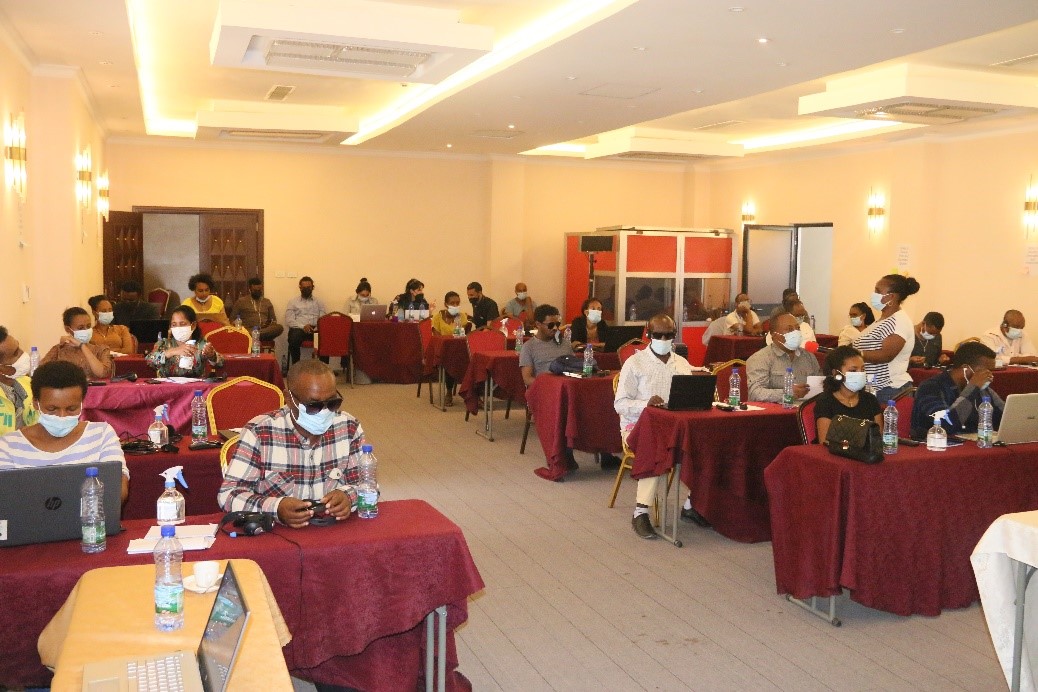
Project brochure, 2020.

